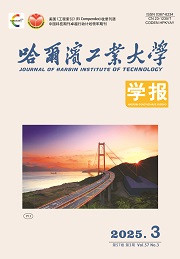| 引用本文: | 秦严严,王昊,王炜,万千.混有CACC车辆和ACC车辆的混合交通流驾驶舒适性[J].哈尔滨工业大学学报,2017,49(9):103.DOI:10.11918/j.issn.0367-6234.201610006 |
| QIN Yanyan,WANG Hao,WANG Wei,WAN Qian.Driving comfort of traffic flow mixed with cooperative adaptive cruise control vehicles and adaptive cruise control vehicles[J].Journal of Harbin Institute of Technology,2017,49(9):103.DOI:10.11918/j.issn.0367-6234.201610006 |
|
| 本文已被:浏览 2138次 下载 1107次 |

码上扫一扫! |
|
|
| 混有CACC车辆和ACC车辆的混合交通流驾驶舒适性 |
|
秦严严1,2,王昊1,2,王炜1,2,万千3,4
|
|
(1.城市智能交通江苏省重点实验室(东南大学), 南京210096; 2. 现代城市交通技术江苏高校协同创新中心, 南京 210096; 3. 桂林电子科技大学 建筑与交通工程学院, 广西 桂林 541004; 4. 华蓝设计(集团)有限公司, 南宁530011)
|
|
| 摘要: |
| 为了探索协同自适应巡航控制(cooperative adaptive cruise control, CACC)车辆对交通系统的潜在影响,分析了CACC车辆市场普及过程中存在的CACC车辆、自适应巡航控制(adaptive cruise control, ACC)车辆与人工驾驶车辆混合交通流驾驶舒适性.应用加州伯克利PATH实车验证的ACC模型和CACC模型进行数值仿真实验,采用国际ISO-2631-1标准评价混合交通流舒适性,并对ACC和CACC期望车间时距进行参数敏感性分析.最后,从交通流稳定性的角度,对舒适性仿真结果进行了讨论.结果表明:随着CACC市场率的增加,舒适性呈现先恶化、再逐渐提升的趋势.较大的ACC车间时距有利于抑制舒适性的恶化程度,CACC车辆对舒适性的提升作用不受其车间时距取值的影响.混合交通流稳定性定性地决定了舒适性的变化趋势,人工车辆安装车车通信设备,有助于舒适性的逐渐提升.
|
| 关键词: 混合交通流 舒适性 稳定性 跟驰模型 协同自适应巡航控制 自适应巡航控制 |
| DOI:10.11918/j.issn.0367-6234.201610006 |
| 分类号:U491.112 |
| 文献标识码:A |
| 基金项目:国家自然科学基金(3,2); 广西科技攻关计划项目(15248002-10); 江苏省研究生科研与实践创新计划(KYCX17-0146) |
|
| Driving comfort of traffic flow mixed with cooperative adaptive cruise control vehicles and adaptive cruise control vehicles |
|
QIN Yanyan1,2,WANG Hao1,2,WANG Wei1,2,WAN Qian3,4
|
|
(1.Jiangsu Key Laboratory of Urban ITS (Southeast University), Nanjing 210096, China; 2.Jiangsu Province Collaborative Innovation Center of Modern Urban Traffic Technologies, Nanjing 210096, China; 3.School of Architecture and Transportation Engineering, Guilin University of Electronic Technology, Guilin 541004, Guangxi, China; 4. Hualan Design and Consulting Group, Nanning 530011, China)
|
| Abstract: |
| In order to explore the potential impact of cooperative adaptive cruise control (CACC) vehicles on traffic systems, driving comfort is analyzed under different CACC penetrations where manual vehicles, CACC vehicles, and adaptive cruise control (ACC) vehicles are mixed in the process of CACC gradually increasing on roads. The ACC and CACC models validated by PATH program were employed in numerical simulations. Driving comfort of the mixed traffic flow was measured using the international organization for standardization(ISO) 2631-1. Parametric sensitivity analysis on the desired time-gap of ACC and CACC was also conducted. Finally, simulation results were discussed from the perspective of traffic flow stability. It is found that comfort first worsens then upgrades with the increase of CACC penetration. Larger ACC time-gap is apt to restrict the comfort deterioration, while various values of CACC time-gap have little effect on improving the driving comfort. The results indicate that the trend of mixed traffic flow stability affects comfort qualitatively. Vehicle-to-vehicle communication equipment of manual vehicles will benefit the gradual increase of the comfort.
|
| Key words: mixed traffic flow driving comfort string stability car-following model cooperative adaptive cruise control adaptive cruise control |







